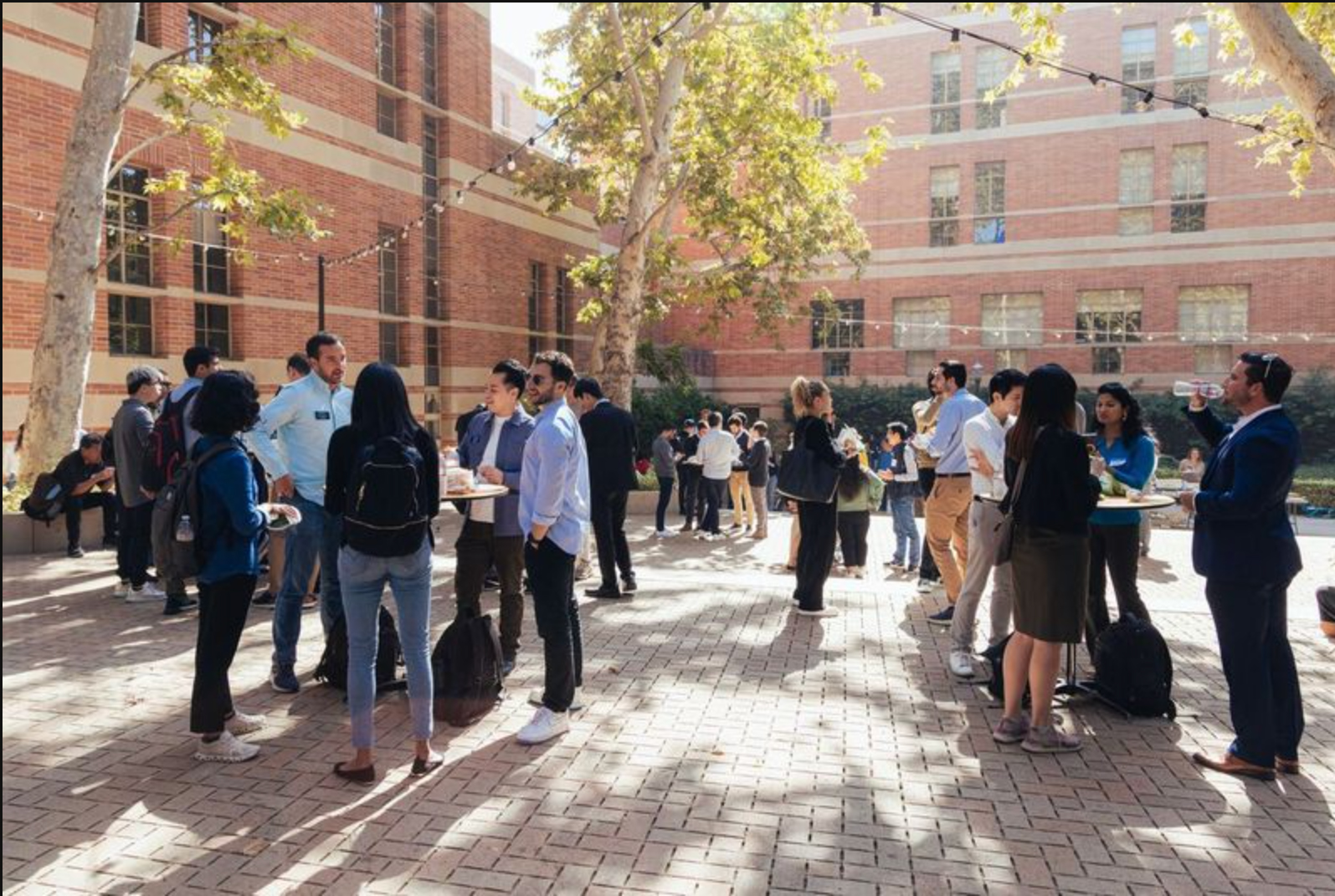Students, industry leaders discuss AI at Tech + Society Conference 2024
Wei Luo, the vice president of autonomous vehicles at Nvidia, was one of the speakers at the Tech + Society 2024 conference at the UCLA Anderson School of Management. Luo, pictured right, discussed artificial intelligence and fielded questions. (Courtesy of Alan Larsen Films)
By Amy L. Wong
Nov. 13, 2024 1:39 a.m.
UCLA students and leaders interested in engineering, education and governance discussed future artificial intelligence solutions Oct. 25.
The Tech + Society Conference 2024, titled “AI: Transforming the Future,” was held by the Easton Technology Management Center at the UCLA Anderson School of Management. Speakers at the event included Sal Khan – the founder and CEO of Khan Academy – and Wei Luo, the vice president of autonomous vehicles at Nvidia, one of the world’s largest technology companies.
Terry Kramer, the faculty director of the Easton Technology Management Center, introduced Khan by stating that Khan Academy began with YouTube videos, around 7,000 of which Khan estimated he created himself.
Khan also said during his speech that personalization is the key to effective learning. He added that the seat time-based system, which prioritizes how long students are in the classroom, is failing many students.
Instead, Khan said what should matter is whether a student understands the material, adding that tutoring can be valuable in pinpointing specific gaps in their knowledge.
“If you can approximate tutoring, which is what we’ve been trying to do at Khan Academy with things like on-demand video, … with things like teacher tools so that teachers can start to personalize for those 30 kids, … we actually have a lot of evidence now that that actually will accelerate students pretty dramatically,” he said.
Khan said OpenAI reached out to his company a few months before ChatGPT was publicly accessible. One issue the AI struggled with was math, which Khan said he found surprising.
Because of this, Khan said his company is now developing an AI-powered tutor called Khanmigo to provide personalized instruction, with guardrails preventing students from cheating such as complete transparency with teachers about what students are using AI for.
Sophy Ji, an event attendee and a graduate student in business analytics, said using AI in education can be good for human development. Ji added that she appreciated how Khan originally created a YouTube channel that is free for all students to learn from.
“People learn a lot,” Ji said. “Education is a very important part of our whole life.”
Ji said her dream is to work in an AI-related role in the future, and she currently does research about self-driving vehicles using a Toyota dataset. She added that she wants to use AI to improve the lives of everyone, not just at the individual level or for a particular group of people.
Stella Petrosyan, another event attendee and a graduate student in business, said she learned that people should work with developments in AI, rather than avoiding them.
“AI and technology – you really have to be with it, not go against it, because it’s going to transform, and it’s going to be expanding,” Petrosyan said. “The amount of problems that we have (in) society and the ways technology can help resolve it and give us time to focus on other areas – I think that’s really important.”
She added that humans need to collaborate and think critically about the trade-offs involved with technological developments. For example, Petrosyan said the trade-off regarding autonomous vehicles is that people may fear taking public transportation that uses it because they do not trust the technology.

Petrosyan also said while autonomous vehicles can save time, they also come with the drawback of increased unemployment in the transportation industry for jobs such as taxi and Uber drivers.
With unemployment rates in mind, Petrosyan said the focus should be improving workers’ skills and using them in other ways.
Ji said she was intrigued by the speech about AI and governance, even though she is not usually politically involved. As an international student, she added that she thinks she should focus on how governments can support startup founders’ innovations.
Antonio Bernardo, dean of the School of Management and the John E. Anderson Chair in Management, said the school seeks to prepare students to become transformative leaders to enact positive change.
“Our goal is to help students be innovative and adaptable problem solvers, and more and more, that means being adept and fluent with data analytics and the latest technologies, including AI,” Bernardo said. “It’s not enough just to be able to solve complex business problems. Transformative leaders also have to develop the character and capabilities to inspire others to action.”
